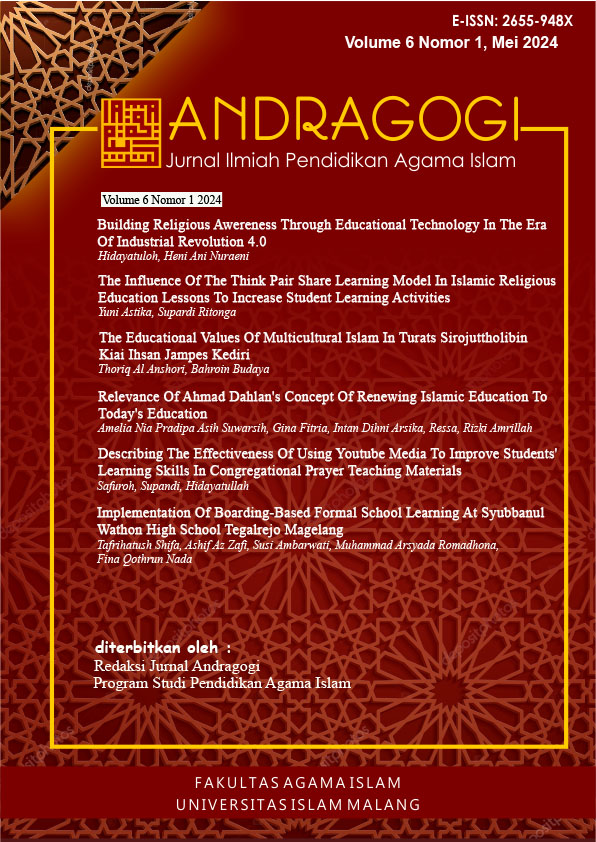THE INFLUENCE OF THE THINK PAIR SHARE LEARNING MODEL IN ISLAMIC RELIGIOUS EDUCATION LESSONS TO INCREASE STUDENT LEARNING ACTIVITIES
DOI:
https://doi.org/10.33474/ja.v6i1.20481Keywords:
learning model, Islamic religious education, learning activitiesAbstract
This research is motivated by the fact that religious education learning is still carried out conventionally, causing less than optimal learning pressure and low learning activity in participating in learning. This research aims to describe the influence of the Think Pair Share learning model in increasing the learning activity of class VII students in Islamic religious education subjects at SMP Negeiri 2 Bengkalis and the supporting or inhibiting factors. This type of research is experimental research with a quantitative approach. Observation, documentation, and tests are used to collect data. The data analysis technique used is descriptive analysis. The results of this research are the first, from the results of hypothesis testing using the Paired Simple T-Test test model, we obtained a significance result of 0.000 which is smaller and <0.05, so Ha is accepted in this research, meaning Ha is accepted in this research, meaning Ha accepted into this research. that there is a significant influence of the TPS (Think Pair Share) type learning model in increasing the learning activities of class VIII students in Islamic religious education subjects at SMP Negeri 2 Bengkalis. Then it can be seen from the test results that the experimental class obtained an average score of 80.31, which was greater than the control class which obtained an average score of 74.38. others, namely a non-conducive classroom atmosphere, time, and selection of discussion partners.
References
Afandi, A. L. (2021). State and Religious Pluralism (Study of Hasyim Muzadi’s Thoughts on Religious Pluralism in Indonesia after the New Order). The International Journal of Politics and Sociology Research, 9(1), 19–25. https://www.ijobsor.pelnus.ac.id/index.php/ijopsor/article/view/13
Arends, R. (2012). Learning to teach. 588. https://books.google.com/books/about/Learning_to_Teach.html?hl=id&id=B1trewAACAAJ
Bulanda, R. E., & Majumdar, D. (2008). Perceived Parent–Child Relations and Adolescent Self-Esteem. Journal of Child and Family Studies 2008 18:2, 18(2), 203–212. https://doi.org/10.1007/S10826-008-9220-3
Jalil, A., & Hidayatullah, M. F. (2022). Desain Lingkungan Belajar Berkonten Pola Asuh Pada Lembaga Pendidikan Islam. Risalah, Jurnal Pendidikan Dan Studi Islam, 8(3), 1003–1017. https://doi.org/10.31943/JURNALRISALAH.V8I3.317
Ketaren, A. B. (2018). The Effect Of Think - Pair - Share Strategy On The Students’ Critical Reading Through Descriptive Text “Joko Widodo” At SMP Muhammadiyah 47 Sunggal. http://repository.umsu.ac.id/handle/123456789/3852
Kristiawan, M., & Muhaimin, M. (2019). Teachers’ Obstacles In Utilizing Information And Communication Technology. INTERNATIONAL JOURNAL OF EDUCATIONAL REVIEW, 1(2), 56–61. https://doi.org/10.33369/IJER.V1I2.8846
Kurjum, M., Muhid, A., & Thohir, M. (2020). THINK-PAIR-SHARE MODEL AS SOLUTION TO DEVELOP STUDENTS’ CRITICAL THINKING IN ISLAMIC STUDIES: IS IT EFFECTIVE? Jurnal Cakrawala Pendidikan, 39(1), 144–155. https://doi.org/10.21831/cp.v39i1.28762
Mundelsee, L., & Jurkowski, S. (2021). Think and pair before share: Effects of collaboration on students’ in-class participation. Learning and Individual Differences, 88, 102015. https://doi.org/10.1016/J.LINDIF.2021.102015
Payadnya, I. P. A. A., & Jayantika, I. G. A. N. T. (2018). Panduan Penelitian Eksperimen Beserta Analisis Statistik dengan SPSS. Deepublish.
Rahmat. (2017). Pendidikan Agama Islam Multidisipliner: Telaah Teori dan Praktik Pengembangan PAI di Sekolah dan Perguruan Tinggi. In Fathorrazi (Ed.), LKiS (1st ed., Vol. 1). LKiS.
Rahmat. (2022). Inovasi Pembelajaran PAI Reorientasi Teori Aplikatif Implementatif (1st ed.). CV. Literasi Nusantara Abadi.
Rusman. (2009). Manajemen Kurikulum. Rajawali Press.
Sakran. (2020). Meningkatkan Keaktifan Belajar IPS melalui Penerapan Pembelajaran Kooperatif Tipe Think Pair Share (TPS) Peserta Didik Kelas VII.B SMP Negeri 22 Mataram | PENSA. PENSA : Jurnal Pendidikan Dan Ilmu Sosial. https://ejournal.stitpn.ac.id/index.php/pensa/article/view/1179
Sugiyono. (2019). Metode Penelitian Kuantitatif, Kualitatif, dan R&D (27th ed.). Alfabeta.









